#Rockefeller Foundation
Text
⚠️ Rockefeller insider gives a rare glimpse of the real reasons for the feminist movement
"One reason was we couldn't tax half the population before Women's Lib. And the second reason was, now we get the kids in school at an early age, we can indoctrinate the kids how to think." 🤔
#pay attention#educate yourselves#educate yourself#knowledge is power#reeducate yourself#reeducate yourselves#think about it#think for yourselves#think for yourself#do your homework#do some research#do your own research#ask yourself questions#question everything#rockefeller foundation#news#whistle blower#you decide
275 notes
·
View notes
Text
British Gov’t Bombshell: ‘One Billion Vaccinated People Now Have VAIDS’
An official British study has confirmed that over one billion people worldwide now have Acquired Immune Deficiency Syndrome (VAIDS) as a direct result of taking the mRNA Covid jab.
#VAIDS#crimes against humanity#biontech#big pharma#crimesagainsthumanity#depopulation agenda#depopulationagenda#mrna vaccine#mrna covid jab#vaccine wars#vaccine damage#vaccines#CEPI#WHO terrorist organisation#Bill Gates Foundation#rockefeller foundation#bioweapons#biological weapon#bioweapon#Bio Terrorist Program#depopulation#globalist agenda#wef#who
13 notes
·
View notes
Text
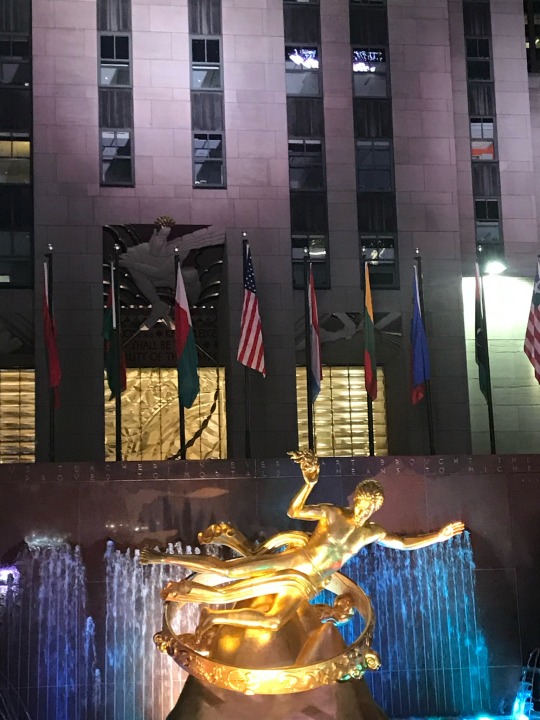

Rockefeller center. Nyc 🗽
#rockefeller#rockefeller street#rockefeller christmas tree#rockefeller foundation#rockefeller plaza#john d. rockefeller#rockefeller center#nycart#central park nyc#nycskyline#nycgo#nyc rp#vintage nyc#nycc 2023#nyclife#nyc girl#nyc#nyck de vries#anime nyc#nyc aesthetic#nyc subway
2 notes
·
View notes
Text
By Oliver Milman and Nina Lakhani
The Guardian
Nov. 9, 2022
The US government has unveiled a new voluntary carbon trading market scheme with the aim of boosting private investment in clean energy projects in developing countries.
John Kerry, the US’s climate envoy, said the new initiative, called the energy transition accelerator, will be created in partnership with the Rockefeller Foundation and the Bezos Earth Fund to help deliver the trillions of dollars of investment needed to help poorer countries transition to renewables and stave off disastrous climate impacts.
Nigeria and Chile are already interested in the plan, Kerry said, which could be operational from next year and will involve the buying and selling of credits that represent carbon pollution. This market, which will not be open to fossil fuel companies, is designed to bolster investment in renewables and help slash emissions.
Annual investment in clean energy needs to triple to more than $4tn (£3.5tn) by 2030, according to the International Energy Agency, to avoid dangerous global heating, but Kerry said leaders of developing countries struggle to raise enough money, requiring new ways to grow private investment.
“We have to win the battle against the climate crisis, not give in to business as usual,” Kerry said. “I’ve been doing this [talking about climate change] since 1988 and I don’t know about you but I’m tired about talking about the same stuff – we have to break the mould. If we don’t come up with creative ways to mobilise money, we are going to blow through 1.5C [of global heating].”
Carbon markets have proved controversial, however, with critics pointing out they often lead to minimal emissions reductions while burnishing the green reputations of large companies. Kerry acknowledged that “mistakes of the past” had damaged the reputation of carbon markets, but vowed that strong safeguards would ensure only “high-quality” credits would be used. Some environmental groups were not convinced, however.
“The private sector can and must play an important role in tackling the climate crisis,” said Rachel Cleetus, policy director at the Union of Concerned Scientists. “However, a voluntary carbon credit program won’t guarantee deep, real cuts in emissions; it’s tantamount to rearranging the deck chairs as the climate ship is going down.”
Read more.
1 note
·
View note
Text
👁 ID2020: Hai mai sentito questo nome?
💰 Pubblicato da Bitcoin Report Italia, 07/03/2024 💰
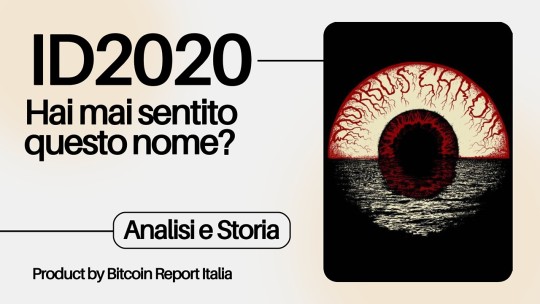
🧐 Nascita e sviluppo del progetto:
👁🗨 ID2020 è un progetto ambizioso nato nel 2015 in seno alla Gavi, the Vaccine Alliance, un’organizzazione globale pubblico-privata che promuove la vaccinazione nei paesi in via di sviluppo. L’iniziativa ha subito trovato il sostegno di potenti fondazioni filantropiche come la Bill & Melinda Gates Foundation e Rockefeller Foundation, nonché di aziende tecnologiche di primaria importanza come Microsoft, Accenture e IBM.
🧐 Obiettivi e finanziamenti:
👁🗨 L’obiettivo dichiarato di ID2020 è quello di fornire un’identità digitale ufficiale a tutti gli individui del pianeta entro il 2030, in particolare a coloro che si trovano ai margini della società e che non possiedono documenti identificativi tradizionali. Si stima che circa 1 miliardo di persone non abbia accesso a un’identità legalmente riconosciuta, il che limita il loro accesso a servizi essenziali come l’istruzione, la sanità e il lavoro.

🧐 Il progetto ID2020 è finanziato da un pool di donatori privati e pubblici, tra cui figurano:
👁🗨 Fondazioni filantropiche: Bill & Melinda Gates Foundation, Rockefeller Foundation, Mastercard Foundation, Omidyar Network
👁🗨 Aziende tecnologiche: Microsoft, Accenture, IBM, Gavi, Giesecke+Devrient
👁🗨 Governi: Svezia, Estonia, Canada

🧐 Funzionamento e tecnologie impiegate:
👁🗨 ID2020 non si propone di creare un’unica identità digitale universale, ma piuttosto di sviluppare un ecosistema di sistemi interoperabili basati su tecnologie standard come la blockchain e l’automazione biometrica. L’obiettivo è quello di creare un sistema sicuro, efficiente e scalabile che permetta agli individui di controllare autonomamente la propria identità digitale.
🧐 Alcune delle tecnologie chiave che potrebbero essere utilizzate per realizzare ID2020 includono:
👁🗨 Blockchain: una tecnologia di registro distribuito che permette di archiviare informazioni in modo sicuro e trasparente
👁🗨 Biometria: l’utilizzo di caratteristiche fisiche come impronte digitali o riconoscimento facciale per identificare gli individui
👁🗨 Intelligenza artificiale: per automatizzare i processi di verifica e autenticazione dell’identità.

🦠 Similitudini con il Green Pass e il wallet di identità digitale europeo:
😷 ID2020 presenta alcune similitudini con il Green Pass e il wallet di identità digitale europeo (EuDi Wallet, che qui in Italia è IT Wallet) in quanto si tratta di sistemi digitali che collegano informazioni personali a un individuo. Di fatto, nella realtà dei fatti, si può chiaramente vedere come il Green Pass sia un “evoluzione” del ID2020 ed il EuDi Wallet è un “evoluzione” del Green Pass, infatti un primo e banale indizio è che tutti e due sono accolti sull’app IO e che altro non è che la piattaforma su cui “gira” il ID2020.

😷 Bene, finora abbiamo fatto una panoramica per capire come appare il progetto, ed ora vediamone le implicazioni.
ID2020 è più di un semplice sito web. È un’organizzazione globale che coinvolge una vasta gamma di attori pubblici e privati. Ma cosa c’è dietro questo progetto?
😷 In primo luogo, facciamo chiarezza sui finanziatori di ID2020. Tra i nomi noti come Microsoft, Facebook e gli altri sopracitati, ci sono alcune sorprese sconcertanti. Accenture, una multinazionale che opera nel campo della consulenza strategica e dell’esternalizzazione, si unisce alla partita. Ma la vera bomba arriva con Gavi, un’organizzazione vaccinale finanziata in gran parte da Bill e Melinda Gates e che ha un ruolo cruciale nello sviluppo dell’identità digitale. Sì, hai letto bene: vaccini e identità digitale, una combinazione inquietante che solleva domande sulla privacy e sulla sicurezza dei dati, soprattutto dopo le conferme avute negli ultimi anni.

😷 Ma le connessioni di ID2020 non finiscono qui. Dietro i finanziamenti ci sono anche aziende multinazionali che operano in settori come la consegna di cibo a domicilio e la gestione delle identità biometriche. A parte i nomi noti, come Microsoft (di proprietà di Bill Gates) Facebook e Mastercard — che si occupa appunto di pagamenti virtuali come i bancomat (cosa c’entra una azienda di pagamenti, se il progetto dovrebbe comprendere solo identità e come abbiamo visto anche vaccini? Sarà collegato la lancio delle CBDC e quindi al sistema di Euro digitale, che l’Europa sta testando?) — troviamo alcuni nomi sconosciuti, guardiamone alcuni:
➖ Accenture PLC: Accenture è considerata la più grande e più importante società di consulenza strategica al mondo. La società svolge anche attività di riprogettazione dei processi aziendali nelle aree finanza, contabilità e controllo di gestione, oltre che di consulenza strategica e cybersecurity.
➖ IDEO: Uno studio di progettazione grafica.
➖ BLOK: Una azienda che opera nella consegna a domicilio di generi alimentari di proprietà di Getir, che è una società turca che offre servizi di consegna su richiesta di articoli alimentari e un servizio di corriere per consegne di cibo ai ristoranti.
➖ Citris Policy Lab: laboratorio che fornisce tutti i mezzi per creare un’identità digitale per le aziende in modo che possano controllare i propri dipendenti con vari meccanismi che vanno dal totem a scanner personali.
➖ Hyperledger: Un progetto open source della Linux Foundation, è il framework blockchain modulare e di fatto standard per le piattaforme blockchain aziendali.
➖ iRespond: Una piattaforma digitale per i servizi di monitoraggio e risposta alle emergenze tramite la creazione di identità biometriche e scansione dell’iride.
➖ Learning Economy: una futura visione del mondo che vede un’educazione di qualità per tutti, ma soprattutto on-line: si spazia dunque in tutti i campi che noi italiani abbiamo visto cambiare proprio negli ultimi due anni e quindi su home-scooling e lo smart working.
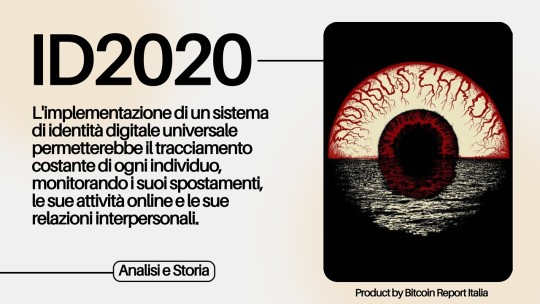
🧐 Cosa significa tutto ciò per te e per il futuro della tua privacy online?
👁🗨 Non solo le aziende coinvolte hanno accesso ai tuoi dati personali, ma potrebbero anche influenzare le politiche vaccinali, economiche, educative e del lavoro a livello globale. E l’Italia non è estranea a questo gioco, avendo contribuito con milioni di euro al finanziamento di Gavi (sì, sempre con i soldi nostri, quelli che non ci sono per le strade, gli ospedali, la scuola ecc ecc).
👁 ID2020 è un progetto ambizioso che mira a fornire un’identità digitale a tutti gli individui del pianeta. Sebbene l’obiettivo possa sembrare nobile, è fondamentale esaminare criticamente le implicazioni di tale iniziativa, in particolare per quanto riguarda la privacy e la libertà individuale. In questo articolo, analizzeremo in dettaglio i potenziali pericoli di ID2020, evidenziando come esso possa rappresentare una minaccia per le nostre libertà fondamentali.
👀 Sorveglianza pervasiva:
👁 Uno dei principali rischi associati a ID2020 è la possibilità di una sorveglianza pervasiva da parte di governi e corporazioni. L’implementazione di un sistema di identità digitale universale permetterebbe il tracciamento costante di ogni individuo, monitorando i suoi spostamenti, le sue attività online e le sue relazioni interpersonali. Tale livello di controllo nelle mani di pochi rappresenterebbe una grave minaccia per la privacy e la libertà di movimento.
👀 Controllo centralizzato:
👁 Un altro motivo di preoccupazione è la natura centralizzata del sistema ID2020. L’accesso e la gestione delle identità digitali sarebbero affidati a poche potenti organizzazioni, creando un rischio di discriminazione e di abuso di potere. La concentrazione del controllo nelle mani di un’élite ristretta potrebbe portare all’esclusione di individui o gruppi marginalizzati, privandoli di diritti e opportunità.
👀 Minacce alla democrazia e all’autonomia:
👁 L’implementazione di un sistema di identità digitale come ID2020 potrebbe avere un impatto negativo sulla democrazia e sull’autonomia individuale. La capacità di monitorare e controllare la popolazione potrebbe essere utilizzata per soffocare il dissenso e limitare la libertà di espressione. Inoltre, la dipendenza da un sistema centralizzato di identità digitale potrebbe rendere gli individui vulnerabili a cyberattacchi e furti di dati, con gravi conseguenze per la loro sicurezza e la loro privacy.
👀 Per illustrare meglio i pericoli di ID2020, consideriamo alcuni esempi concreti:
👁 Controllo della mobilità: Un sistema di identità digitale potrebbe essere utilizzato per limitare la libertà di movimento degli individui, impedendo loro di accedere a determinate zone o di viaggiare liberamente.
👁 Controllo sociale: Le informazioni raccolte attraverso ID2020 potrebbero essere utilizzate per monitorare e controllare il comportamento sociale, discriminando individui o gruppi in base alle loro opinioni o affiliazioni.
👁 Esclusione sociale: Coloro che non sono in grado di ottenere o di mantenere un’identità digitale potrebbero essere esclusi da importanti servizi e opportunità, come l’accesso all’istruzione, al lavoro o all’assistenza sanitaria.
🧿 Alternative decentralizzate:
Esistono alternative decentralizzate all’identità digitale che offrono una maggiore protezione della privacy e dell’autonomia individuale. Soluzioni basate su tecnologie come la blockchain permettono agli individui di gestire autonomamente la propria identità digitale, senza la necessità di affidarsi a sistemi centralizzati controllati da terze parti.
👁 ID2020 rappresenta una minaccia per la privacy, la libertà e la democrazia. È fondamentale essere consapevoli dei potenziali pericoli di questo progetto e sostenere alternative decentralizzate che proteggono l’autonomia individuale e la sovranità dei dati. La difesa delle nostre libertà online è fondamentale per costruire un futuro libero e aperto a tutti.
🧿 Invitiamo all’azione:
👁 Informati sui pericoli di ID2020 e condividi le tue conoscenze con altri.
Sostieni organizzazioni che promuovono alternative decentralizzate all’identità digitale.
Unisciti alla resistenza contro la sorveglianza di massa e la centralizzazione del potere.
Insieme, possiamo difendere le nostre libertà e costruire un futuro migliore per tutti.
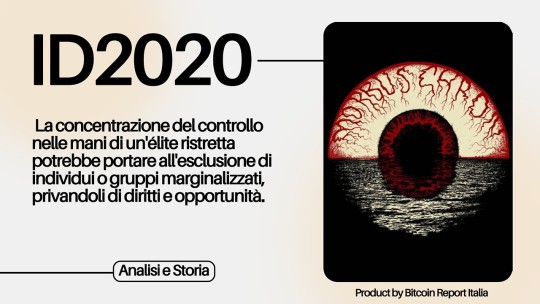
🚀 Leggi tutti i nostri articoli: https://t.me/BitcoinReportChannel
Nella nostra community Bitcoin Report Italia, troverai un ambiente accogliente dove gli esperti ti guideranno nei primi passi nel trading, offrendo analisi, strategie di trading e l’opportunità di partecipare al CopyTrading con trader professionisti. Iscrivendoti con il nostro referral code su Bitget (6w5d), potrai avere un contatto diretto con trader che ti aiuteranno a crescere nel mondo del trading di criptovalute. 🚀
📣 https://t.me/Bitcoin_Report_Italia
#criptovalute#BitcoinReportItalia#crypto#id2020#gavi#digital identity#identità digitale#EuDiWallet#microsoft#bill gates#rockefeller center#rockefeller foundation#ibm#hyperledger#Ledger#bitcoin#halving
0 notes
Text
The Gates Basis annual funds for 2024 is its largest but
The Invoice & Melinda Gates Basis authorised its largest annual funds ever, committing $8.6 billion to assist plug gaps in total support for well being applications on this planet’s poorest nations. The spending improve in 2024 will assist a variety of targets together with the eradication of polio, improvement of latest tuberculosis medicine, and supply of provides to stem little one and…
View On WordPress
#Bill & Melinda Gates Foundation#Bill Gates#Business#Finance#Health#Infant mortality#Mark Suzman#Maternal death#Medical#Melinda French Gates#Microsoft#Pharma#public health#Quartz#Rockefeller Foundation#Social Issues#the gates#World Economic Forum#World Health Organization
0 notes
Text
Leaked Video Reveals Rockefeller ‘Predicted’ Covid Jab Depopulation Agenda in 1994
– Help Slash Your Energy Bills Now: http://dontwastepower.com – Claim your ownership stake in The People’s Voice: https://collective.thepeoplesvoice.tv According to the mainstream media, the depopulat
Bron: Leaked Video Reveals Rockefeller ‘Predicted’ Covid Jab Depopulation Agenda in 1994

View On WordPress
0 notes
Text
Americans eager to pursue such research were thrown back upon the resources of state universities, which at the time were willing to invest little in the field, or upon what between the wars was the principal patron of the science in the United States, the Rockefeller Foundation, which was something of a private precursor to the National Science Foundation and National Institutes of Health combined.
"In the Name of Eugenics: Genetics and the Uses of Human Heredity" - Daniel J. Kevles
#book quote#in the name of eugenics#daniel j kevles#nonfiction#american#eager#research#genetics#scientific research#limited resources#state university#investment#patron#united states#rockefeller foundation#precursor#private funding#national science foundation#national institutes of health
0 notes
Text
Watch "Is Government the New God? - The Religion of Totalitarianism" on YouTube
youtube
"And it was allowed to give breath to the image of the beast, so that the image of the beast might even speak and might cause those who would not worship the image of the beast to be slain. Also it causes all, both small and great, both rich and poor, both free and slave, to be marked on the right hand or the forehead, so that no one can buy or sell unless he has the mark, that is, the name of the beast or the number of its name."
Revelation 13:15-17
You know as well I do, unlike in times past, that the technology is in place to make this happen. Be watchful and prayerful that you may stand firm in the face of the coming tribulation.
#nwo new world order#agenda 2030#agenda 21#great reset#world economic forum#rockefeller foundation#goverment corruption#government overreach#government scheme#government lies#government control#mk ultra#mass psychosis#orwellian#orwell 1984#brave new world#mark of the beast#end times#Youtube
0 notes
Text
Did You Know That On July 28, 2020, The Rockefeller Foundation Published A Document Called "Reset the Table: Meeting the Moment to Transform the U.S. Food System."
It's all about the upcoming food shortages.
0 notes
Text

The foundations of Rockefeller Center, 1932.
Photo: Berenice Abbott via the Museum of Contemporary Art
#vintage New York#1930s#Berenice Abbott#Rockefeller Center#building foundation#construction#b&w photography#building
78 notes
·
View notes
Text
Population Collapse: US Birth Rate Plunges To All-Time Low As Unexpected Deaths Accelerate
#PopulationCollapse#USBirthRate#UnexpectedDeaths#crimes against humanity#biontech#big pharma#crimesagainsthumanity#depopulation agenda#depopulationagenda#mrna vaccine#wef#WEF terrorist organisation#CEPI#WHO terrorist organisation#Bill Gates foundation#rockefeller foundation#globalist agenda#Globalist Parasites
8 notes
·
View notes
Text
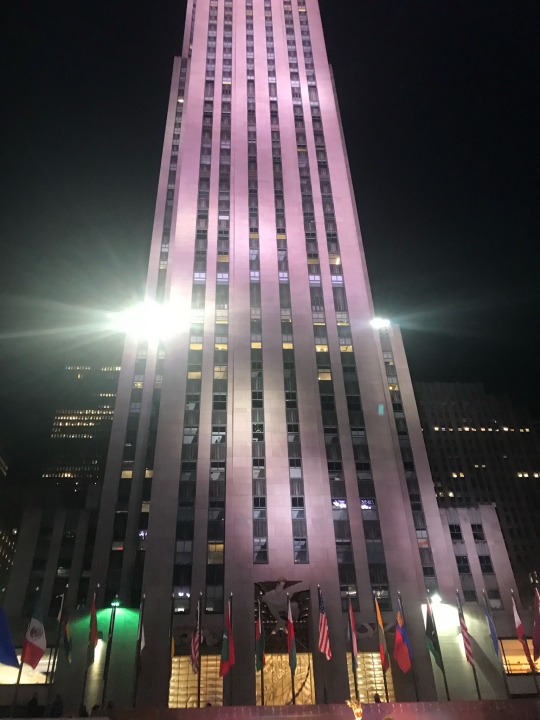


Rockefeller center. New York City 🌃
#rockefeller#rockefeller center#john d. rockefeller#rockefeller plaza#rockefeller foundation#rockefeller christmas tree#rockefeller street#nycart#central park nyc#nycskyline#nycgo#nyc girl#nyc#nyclife#nycc 2023#vintage nyc#nyc rp#nyck de vries#anime nyc#nyc aesthetic#nyc subway
0 notes
Text
By Isabel Vincent
The cash from Soros and his acolytes has been critical to the Columbia protests that set off the national copycat demonstrations.
Three groups set up the tent city on Columbia’s lawn last Wednesday: Students for Justice in Palestine (SJP), Jewish Voice for Peace (JVP) and Within Our Lifetime.
At the “Gaza Solidarity Encampment,” students sleep in tents apparently ordered from Amazon and enjoy delivery pizza, coffee from Dunkin’, free sandwiches worth $12.50 from Pret a Manger, organic tortilla chips and $10 rotisserie chickens.
An analysis by The Post shows that all three got cash from groups linked to Soros. The Rockefeller Brothers Fund also gave cash to JVP.
The fund is chaired by Joseph Pierson, and includes David Rockefeller Jr, a fourth-generation member of the oil dynasty, on its board of directors. The non-profit gives money to “sustainable development” and “peace-building.”
And a former Wall Street banker, Felice Gelman, a retired investment banker who has dedicated her Wall Street fortune to pro-Palestinian causes, funded all three groups.

17Free sandwiches from upscale takeout joint Pret a Manger are on offer at the encampment, worth up to $12, and $10 rotisserie chickens. Cash for the encampment has come from billionaire investor George Soros.NYPJ
Both SJP and JVP were expelled from Columbia University in November for “threatening rhetoric and intimidation.” JVP blamed Israel for the Oct 7 Hamas terrorist attack that left 1,200 Israelis dead.
“Israeli apartheid and occupation — and United States complicity in that oppression — are the source of all this violence,” JVP said in a statement on its website.
SJP called the terrorist strike on Israel “a historic win.”
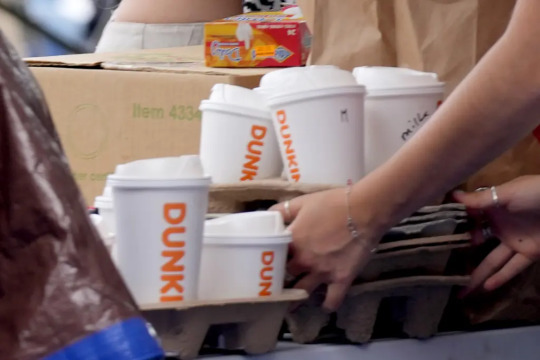
17Also on offer for the thirsty anti-Israeli protesters camped out at Columbia is free coffee from Dunkin’. Behind the scenes, the groups organizing the encampment have received cash from Soros and another former Wall Street banker.NYPJ
An analysis by The Post shows how Soros and Gelman’s cash made its way to the students through a network of nonprofits that help obscure their contributions.
Soros has given billions to the Open Society Foundations which his son Alexander — whose partner is Huma Abedin, Hillary Clinton’s top aide and the estranged wife of pervert Anthony Weiner — now controls.
In turn, Open Society has given more than $20 million to the Tides Foundation, a progressive nonprofit “fiscal sponsor” that then sends the cash to smaller groups.
Those groups include A Jewish Voice for Peace, which between 2017 and 2022 has received $650,000 from Soros’ Open Society. Its advisers include the academic Noam Chomsky and the left-wing feminist author Naomi Klein.
JVP has been a prominent part of the protests at Columbia and one of its student members was among a group expelled from the university for inviting the leader of a proscribed terrorist group, Khaled, to the “Resistance 101” Zoom meeting.
Soros has also donated $132,000 to WESPAC, called in full the Westchester People’s Action Coalition Foundation.
#george soros#columbia university#open society foundations#rockefeller brothers fund#jewish voice for peace#gaza solidarity encampment#within our lifetime#students for justice in palestine
16 notes
·
View notes
Text
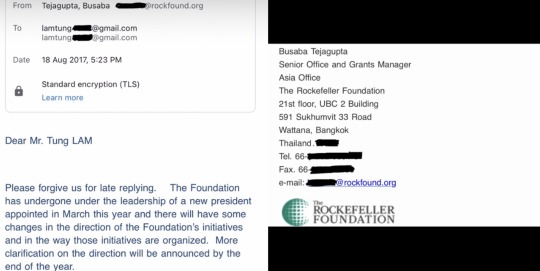
Prior communication with The Rockefeller Foundation back in 2017 before formal legislation of advance directive in 2018
1 note
·
View note
Text
Too Hot to Work? America's Next Big Labor Battle
— By Giulia Carbonaro | August 14, 2023
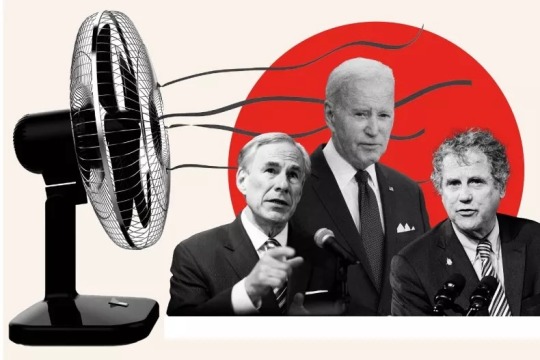
A Newsweek photo graphic showing, from left, Texas Gov. Greg Abbott, Joe Biden and U.S. Senator Sherrod Brown. Newsweek; Source Photo; Brandon Bell/Getty; Alessandro Rampazzo/AFP Via Getty; Angelo Merendino/Getty Images
American workers are dying, local businesses are reporting a drop in productivity, and the country's economy is losing billions all because of one problem: the heat.
July was the hottest month on record on our planet, according to scientists. This entire summer, so far, has been marked by scorching temperatures for much of the U.S. South, with the thermometer reaching triple digits in several places in Texas between June and July.
In that same period, at least two people died in the state while working under the stifling heat enveloping Texas, a 35-year-old utility lineman, and a 66-year-old USPS carrier. According to the Bureau of Labor Statistics, there were 36 work-related deaths due to environmental heat exposure in 2021, the latest data available. This was a drop from 56 deaths in 2020, and the lowest number since 2017.
"Workers who are exposed to extreme heat or work in hot environments may be at risk of heat stress," Kathleen Conley, a spokesperson for the Centers for Disease Control and Prevention (CDC), told Newsweek. "Heat stress can result in heat stroke, heat exhaustion, heat cramps, or heat rashes. Heat can also increase the risk of injuries in workers as it may result in sweaty palms, fogged-up safety glasses, and dizziness. Burns may also occur as a result of accidental contact with hot surfaces or steam."
While there is a minimum working temperature in the U.S., there's no maximum working temperature set by law at a federal level. The CDC makes recommendations for employers to avoid heat stress in the workplace, but these are not legally binding requirements.
The Biden administration has tasked the Occupational Safety and Health Administration (OSHA) with updating its worker safety policies in light of the extreme heat. But the federal standards could take years to develop—leaving the issue in the hands of individual states.
Things aren't moving nearly as fast as the emergency would require—and it's the politics around the way we look at work, the labor market, and the rights of workers in the U.S. that is slowing things down.
A Deep Political Divide
"There's remarkably little in terms of regulation, and of course, given our divided political views in this country—on the right, Republicans in general, are trying to resist more regulation that's premised on continuing global warming," Gregory DeFreitas, Professor of Economics and Director of the Center for the Study of Labor and Democracy at Hofstra University, New York, told Newsweek.
There's a bill, initially introduced in 2019 and now revived by Senator Sherrod Brown of Ohio, a Democrat, that would move in the direction of setting a federal standard for temperature levels, and other heat-related requirements.
The Heat Illness and Fatality Prevention Act would create a universal heat standard requirement through OSHA for workers threatened by hot working conditions.
"No worker should have to endure life-threatening heat to provide for their family. This would be an important step to protect Ohio workers on the job," said Brown in a statement available on his website. "We know too many workers still work in dangerous conditions, putting their health and safety on the line every day to provide for their families. There's not much dignity in a job where you fear for your health or your life."
Newsweek has contacted Brown for comment by phone but did not receive a response.
"Given the political divisions, it's hard to say what its chances of passage are, although you'd think that another record-setting year in heat would put more pressure on taking similar action," DeFreitas said.
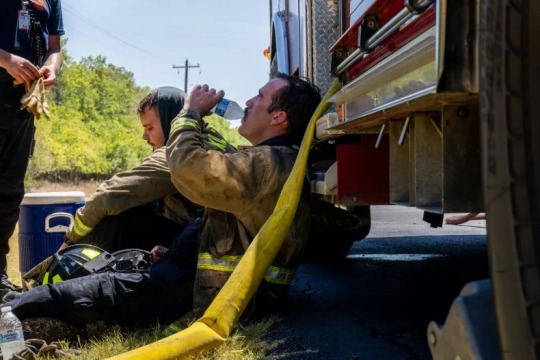
Members of the Hays County Emergency Service Districts and the Kyle and Buda Fire Departments rest together while combatting a wildfire during an excessive heat warning on August 08, 2023 in Hays County, Texas. Brandon Bell/Getty Images
This political division over safety regulations in the workplace, according to DeFreitas, started during Donald Trump's presidency. "The minute Trump got in office, he declared war on regulations," he said. "In 2017, he cut OSHA's job safety rules, employers were not required to make as frequent accident reports, there were to be no surprise inspections of factories and workplaces," he said.
"As a result what you have is a weakened federal agency, but that fits with the idea of deregulating businesses and giving them more freedom—the so-called voluntary self-regulation, which was common under both the Bush and the Trump administration."
He added: "That's a deep philosophical orientation of the current Republican Party, regardless of what the dangers are, whether it is climate change or anything else, they want to cut as much regulation and regulatory steps as they can." Newsweek contacted OSHA but did not receive a prompt response.
Billions Up in Smoke
As well as harming or losing people, the country is losing money to the heat.
According to a recent study by the Adrienne-Arsht Rockefeller Foundation Resilience Center, housed at the Atlantic Council, the U.S. is already losing approximately $100 billion on average every year from the drop in labor productivity caused by the current level of heat.
That's "approximately the annual budget for the Department of Homeland Security ($51.7 billion) and the Department of Housing and Urban Development ($44.1 billion) combined (U.S. Government Publishing Office 2019)," researchers write.
The study estimates that, if no significant effort is made to reduce emissions or adapt to extreme heat, labor productivity losses could double to nearly $200 billion by 2030 and reach $500 billion by 2050.
For labor experts, there's no doubt that the extreme heat, which is becoming more frequent due to climate change and our collective failure to bring down carbon emissions on a global level, calls for drastic changes in the way Americans work.
"It's a huge but under-appreciated issue that we're dealing with, not just with outdoor workers, but also oil and gas field workers, people working in warehouses, construction workers," Kurt Shickman, director of Extreme Heat Initiatives at the Adrienne Arsht-Rockefeller Foundation Resilience Center, told Newsweek. "It's a huge swath of our economy that's already increasingly affected by the heat today."
When it's really hot outside, people work more slowly and they are more prone to make mistakes and have accidents, said Shickman. "You may have situations where the weather is so dangerous that you just physically can't have people outside, so you lose work hours," he added.
"We're going to need all kinds of dramatic changes in terms of factory design, warehouse design, and workplace design," said DeFreitas. "The bill is going to be very, very high unless we do something dramatic soon."
Shickman thinks that change is going to depend on regulation. "I don't think we can count on this being self-policed by businesses. It hasn't been so far."
A State-Level Battle
In the immediate future, protecting workers from heat stress—when it's so hot that the body can't keep its ideal internal temperature and can suffer heat stroke and exhaustion—is then up to state lawmakers and the businesses themselves.
California, for example, has set a maximum temperature at which outdoor workers can safely do their job, as well as introducing other regulations aimed at protecting employees, like more frequent periods in the shade and water breaks. More action has been taken in this direction in a handful of states including Minnesota, Washington, Oregon, and New York.
But while states like California have succeeded in introducing effective safety regulations, in other states similar attempts have been rebuffed by the opposition of industry groups and lobbyists.
In Texas, Republican Governor Greg Abbott recently approved a law rescinding city and county ordinances requiring mandatory water breaks for construction workers—a move that generated much controversy and backlash from Texas Democrats. Supporters of the bill, on the other hand, said the law will help rein in local and county officials that have exceeded their authority and will give small businesses the consistency they need to invest and grow.
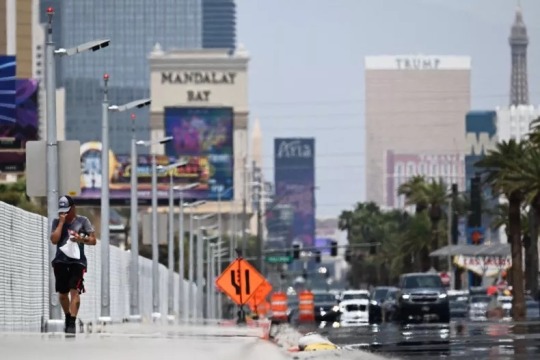
Heat waves cause distortion on the horizon as a pedestrian walks along South Las Vegas Blvd in Las Vegas, Nevada, on July 30, 2023, as temperatures reach more than 100 degrees Fahrenheit. Patrick T. Fallon/AFP Via Getty Images
In Nevada, lawmakers for months have put off giving final approval to heat safety regulations adopted by OSHA, as the state's Department of Business and Industry discusses the concerns of industry groups over the new policies, as reported by The Washington Post.
"With our workers outside during extreme heat, requiring basic water and rest breaks is just common sense—and it will save lives," Nevada Senator Catherine Cortez Masto, a Democrat, told Newsweek. "As we continue to experience record heat waves, we need to hold employers accountable and protect workers across the country."
The Cost of Change
Investing in making the workplace safer for employees might cost companies more than they're willing to spend, even as they are losing workers' productivity and hours.
"A lot of the generalized skilled work, what we would call lower skilled work, is in warehouses," Lindsey Cameron, an assistant professor of management at the Wharton School, University of Pennsylvania, told Newsweek. "Warehouses are big, massive football fields. It costs a lot of money and a lot of infrastructure to try to cool down. And sometimes it's just impossible because you have all these trucks going in and out and people going in and out."
Some businesses have already moved to protect their workers from heat, knowing that the cost of ignoring the issue could eventually be higher than trying to fix it.

A construction worker moves materials as people sit and drink water along the steps of the Lincoln Memorial in Washington, DC, on July 27, 2023, as temperatures are expected to reach record highs. Brenden Smialowski/AFP Via Getty Images
Jose Garza, the national environmental health and safety leader at California-headquartered general contractor DPR Construction, told Newsweek that the company—which has over 10,000 employees—has implemented heat safety procedures that go beyond the state-mandated regulation, including introducing cooling stations, handing out electrolyte drinks, and giving more breaks to workers.
"We see it as the cost of taking care of people and the right thing to do," he said. "You can either plan for it or react to it, because if you're not planning for it, those breaks are going to happen when the worker is no longer able to work, when they're sick, when they're well beyond the point where their bodies are unable to cool themselves down."
Garza said that employers who care about their workers should go "above and beyond" available regulation to protect them from heat.
'A Long Time' Coming
Experts agree that change won't come from the businesses—and will likely not come soon unless there's committed political action.
"It's really going to take both state and federal movement on this," DeFreitas said. "And I'm hoping that certainly in states like New York, where there does seem to be more attention to workplace safety, that they can move in the direction of the federal bill that's now stuck in progress."
"I don't think the United States has such a great backbone when it comes to climate issues," said Cameron. "We pulled out of the Paris Agreement [under former President Trump in 2017, but rejoined in 2021 under President Joe Biden]. I think there's going to be a lot more attention given to climate change, but it may take a long time to be able to see those changes."
#Newsweek#Too Hot Climate#America’s 🇺🇸 Next Big Labor Battle#Giulia Carbonaro#Scortching Heat#U.S. South#Texas#Bureau of Labor Statistics#Kathleen Conley#Centers For Disease Control and Prevention (CDC)#Occupational Safety and Health Administration (OSHA)#Political Divisions#Republicans#Gregory DeFreitas#Study of Labor and Democracy at Hofstra University | New York#Senator Sherrod Brown of Ohio (D)#The Heat Illness and Fatality Prevention Act#Adrienne-Arsht Rockefeller Foundation Resilience Center#Department of Homeland Security#Department of Housing and Urban Development#Kurt Shickman#Minnesota | Washington | Oregon | New York#Texas Governor Greg Abbott (R)#Nevada#The Washington Post#Nevada Senator Catherine Cortez Masto (D)
0 notes